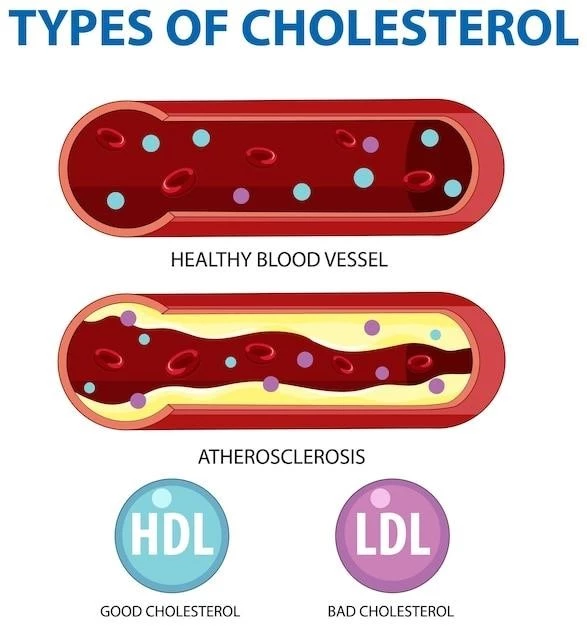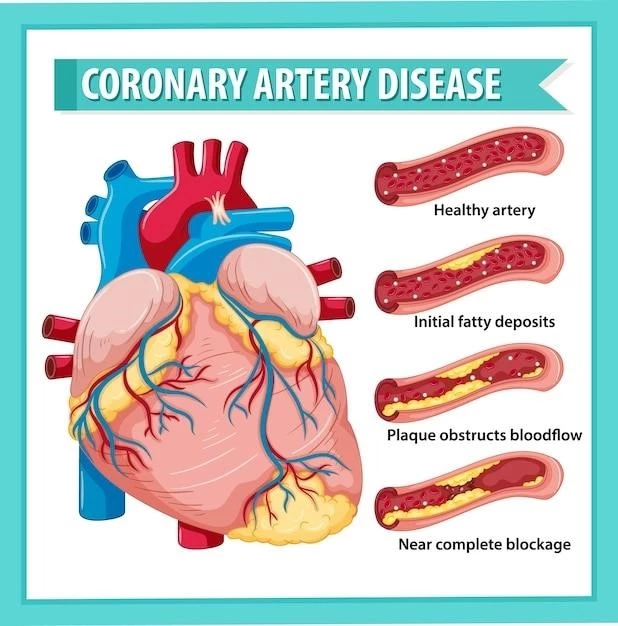Learn about the link between high cholesterol levels‚ LDL receptors‚ and atherosclerosis.
Explore the role of Apo B-100 in cholesterol metabolism and its association with cardiovascular disease.
Understanding Hypercholesterolemia
Hypercholesterolemia is a condition characterized by high levels of cholesterol in the blood. Understanding the mechanisms behind this disorder is essential for effectively managing and treating it.
LDL receptors play a crucial role in regulating cholesterol levels in the body. They are responsible for removing LDL (low-density lipoprotein) cholesterol from the bloodstream‚ preventing its accumulation and the development of atherosclerosis.
Atherosclerosis is a condition where plaque builds up inside the arteries‚ leading to restricted blood flow and an increased risk of cardiovascular disease. High cholesterol levels‚ especially LDL cholesterol‚ contribute to the development of atherosclerosis.
Individuals with genetic mutations affecting cholesterol metabolism‚ such as the Arg3500 mutation of Apo B-100‚ are at higher risk of developing hypercholesterolemia and its associated complications. This mutation can disrupt the normal function of Apo B-100‚ leading to elevated LDL cholesterol levels.
Managing hypercholesterolemia involves a combination of lifestyle modifications and medication. Lipid-lowering therapies‚ such as statins‚ can help reduce LDL cholesterol levels and lower the risk of cardiovascular events in individuals with hypercholesterolemia.

By understanding the underlying mechanisms of hypercholesterolemia‚ healthcare providers can tailor treatment plans to effectively address the specific needs of patients with genetic disorders impacting cholesterol metabolism. Regular monitoring and adherence to treatment recommendations are vital in managing hypercholesterolemia and reducing the risk of cardiovascular complications.
Introduction to Apolipoprotein B-100
Apolipoprotein B-100 (Apo B-100) is a key protein involved in cholesterol metabolism and the transport of lipoproteins in the body. It plays a crucial role in the assembly and secretion of very low-density lipoprotein (VLDL) and LDL particles‚ which are essential for carrying cholesterol to various tissues.
Individuals with mutations in the Apo B-100 gene‚ such as the Arg3500 mutation‚ may experience disruptions in lipid metabolism‚ leading to elevated LDL cholesterol levels and an increased risk of atherosclerosis.
Apo B-100 interacts with LDL receptors on the surface of cells‚ facilitating the uptake of LDL particles from the bloodstream. Mutations in Apo B-100 can impair this interaction‚ affecting the clearance of LDL cholesterol and contributing to the development of hypercholesterolemia.
Understanding the role of Apo B-100 in cholesterol transport and metabolism is crucial for identifying genetic disorders like hypercholesterolemia due to the Arg3500 mutation. By targeting specific pathways influenced by Apo B-100‚ healthcare providers can develop personalized treatment strategies to manage cholesterol levels and reduce the risk of cardiovascular disease.
Further research into the functions of Apo B-100 and its implications for lipid metabolism may provide insights into novel therapeutic approaches for individuals with genetic disorders impacting cholesterol transport. By staying informed about the latest advancements in lipid research‚ healthcare professionals can better support patients with hypercholesterolemia and improve outcomes in managing this condition.
Atherosclerosis and Cardiovascular Disease
Atherosclerosis is a progressive condition characterized by the buildup of plaque inside arteries‚ leading to reduced blood flow and an increased risk of cardiovascular events. High cholesterol levels‚ particularly LDL cholesterol‚ play a significant role in the development and progression of atherosclerosis.
Individuals with hypercholesterolemia due to genetic mutations like the Arg3500 mutation of Apo B-100 have an elevated risk of developing atherosclerosis and cardiovascular disease. The impaired cholesterol metabolism resulting from these mutations contributes to the accumulation of LDL cholesterol in the arteries‚ promoting plaque formation.
As plaque builds up in the arteries‚ it can narrow the blood vessels and restrict blood flow to vital organs like the heart and brain. This can lead to serious complications such as heart attacks‚ strokes‚ and peripheral artery disease‚ highlighting the importance of managing cholesterol levels in individuals at risk of atherosclerosis.
Reducing LDL cholesterol levels through lifestyle modifications and lipid-lowering therapies is crucial in preventing the progression of atherosclerosis and reducing the incidence of cardiovascular events. Regular monitoring of cholesterol levels and adherence to treatment plans can help individuals with genetic disorders impacting cholesterol metabolism maintain optimal cardiovascular health.
By raising awareness about the link between hypercholesterolemia‚ genetic mutations like the Arg3500 mutation of Apo B-100‚ and cardiovascular disease‚ healthcare providers can empower patients to take proactive steps towards managing their cholesterol levels and reducing their risk of atherosclerosis-related complications.
Genetic Disorders and Hyperlipidemia
Genetic disorders can have a significant impact on lipid metabolism‚ leading to conditions like hyperlipidemia‚ characterized by elevated levels of lipids in the blood. Mutations in genes encoding key proteins involved in cholesterol transport and metabolism‚ such as Apo B-100‚ can contribute to the development of hyperlipidemia.
The Arg3500 mutation of Apo B-100 is one example of a genetic variant that can result in hypercholesterolemia‚ a form of hyperlipidemia characterized by high levels of LDL cholesterol. Individuals carrying this mutation may experience challenges in regulating their cholesterol levels‚ increasing their susceptibility to atherosclerosis and cardiovascular disease.
Understanding the genetic basis of hyperlipidemia‚ including mutations like the Arg3500 variant‚ is essential for identifying at-risk individuals and implementing appropriate screening and management strategies. Genetic testing can help identify specific mutations associated with elevated lipid levels‚ enabling healthcare providers to offer personalized interventions to patients with genetic disorders impacting lipid metabolism.
Educating patients about the genetic components of hyperlipidemia and the potential implications for their cardiovascular health is crucial in promoting proactive management of lipid levels. By emphasizing the importance of genetic screenings and lifestyle modifications‚ healthcare professionals can empower individuals with genetic disorders like the Arg3500 mutation of Apo B-100 to take control of their lipid profiles and reduce their risk of cardiovascular complications.
Diagnosis and Treatment Options
Diagnosing hypercholesterolemia due to the Arg3500 mutation of Apo B-100 involves a comprehensive assessment of lipid levels‚ genetic testing‚ and evaluation of cardiovascular risk factors. Screening for genetic mutations associated with hyperlipidemia can help identify individuals with specific genetic predispositions to elevated cholesterol levels.
Once a diagnosis is confirmed‚ the management of hypercholesterolemia typically involves a multifaceted approach. Lifestyle modifications‚ including a heart-healthy diet‚ regular exercise‚ smoking cessation‚ and weight management‚ are essential components of treatment. These lifestyle changes can help improve lipid profiles and reduce the risk of cardiovascular complications.
In addition to lifestyle interventions‚ lipid-lowering therapies may be prescribed to individuals with hypercholesterolemia to lower LDL cholesterol levels and mitigate the risk of atherosclerosis. Medications such as statins‚ PCSK9 inhibitors‚ bile acid sequestrants‚ and ezetimibe can be used to effectively manage cholesterol levels in patients with genetic disorders impacting lipid metabolism.
Regular monitoring of lipid levels and cardiovascular health is crucial in assessing the response to treatment and adjusting therapy as needed. Healthcare providers may recommend routine blood tests to measure cholesterol levels and evaluate the efficacy of lipid-lowering medications in controlling hypercholesterolemia.
By collaborating with healthcare professionals and adhering to personalized treatment plans‚ individuals with hypercholesterolemia due to genetic mutations like the Arg3500 variant can effectively manage their condition and reduce their risk of cardiovascular complications. It is essential to maintain open communication with healthcare providers to optimize treatment outcomes and promote long-term cardiovascular health.
Impact on Lipoproteins and Triglyceride Levels
The Arg3500 mutation of Apo B-100 in hypercholesterolemia can have significant effects on lipoproteins and triglyceride levels in the body. This genetic variant alters the function of Apo B-100‚ a critical component of lipoproteins involved in cholesterol transport.
Individuals with the Arg3500 mutation may experience elevated levels of LDL cholesterol due to impaired clearance of LDL particles from the bloodstream. LDL cholesterol is a key player in atherosclerosis progression‚ highlighting the importance of managing its levels in individuals with hypercholesterolemia.
Moreover‚ the altered lipid metabolism resulting from the Arg3500 mutation can impact other lipoproteins‚ such as VLDL and HDL cholesterol. Changes in these lipoproteins can influence cardiovascular risk and the development of atherosclerosis‚ underscoring the complexity of lipid metabolism in individuals with genetic disorders affecting cholesterol transport.
Triglyceride levels may also be affected in individuals with the Arg3500 mutation‚ as disruptions in lipid metabolism can lead to dysregulation of triglyceride-rich lipoproteins. High triglyceride levels are associated with an increased risk of cardiovascular disease and may exacerbate the complications of hypercholesterolemia.
Understanding the impact of the Arg3500 mutation on lipoproteins and triglyceride levels is crucial for tailoring treatment strategies to address specific lipid abnormalities in patients with hypercholesterolemia. By targeting multiple aspects of lipid metabolism‚ healthcare providers can optimize cardiovascular health outcomes and reduce the risk of atherosclerosis-related events in individuals with genetic mutations impacting Apo B-100 function.
Future Research and Implications
Future research on hypercholesterolemia due to the Arg3500 mutation of Apo B-100 holds promise for advancing our understanding of genetic disorders impacting cholesterol metabolism and personalized treatment approaches. Investigating the molecular mechanisms underlying the Arg3500 mutation can provide insights into how this genetic variant influences cholesterol transport and contributes to elevated LDL cholesterol levels.
Exploring novel therapeutic strategies targeted at mitigating the effects of the Arg3500 mutation may help improve outcomes for individuals with hypercholesterolemia. Future studies could focus on developing gene-specific treatments or gene-editing technologies to address genetic mutations affecting lipid metabolism and reduce the risk of cardiovascular complications.
Furthermore‚ research efforts aimed at elucidating the interactions between Apo B-100‚ LDL receptors‚ and cholesterol metabolism could offer new avenues for developing tailored interventions for individuals with hypercholesterolemia. Understanding the intricate relationships within the lipid transport pathways may lead to innovative therapies that target specific components of the cholesterol regulatory system.
Implications of ongoing research on hypercholesterolemia due to genetic mutations extend beyond individual patient care. By identifying genetic markers associated with elevated cholesterol levels‚ healthcare providers can implement early screening strategies and preventive measures to promote cardiovascular health in at-risk populations.
Collaboration between scientists‚ healthcare professionals‚ and regulatory bodies is essential to translate research findings into clinical practice effectively. By fostering interdisciplinary partnerships and prioritizing research into genetic disorders impacting cholesterol metabolism‚ the healthcare community can improve outcomes for individuals with hypercholesterolemia and advance the field of precision medicine.
